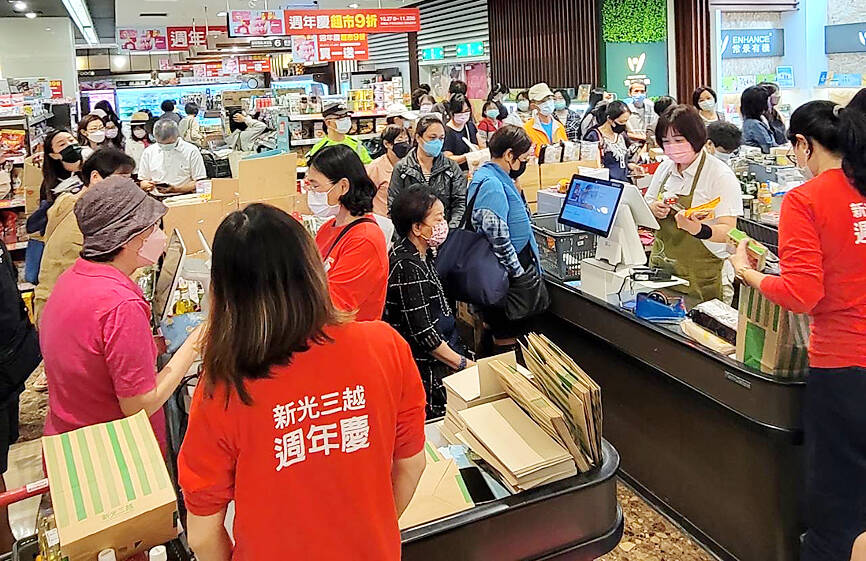Sales at domestic retailers are expected to fall due to fewer holidays this month after sales rose 7.7 percent month-on-month last month, the Ministry of Economic Affairs said on Wednesday.
Retail sales grew to NT$380.7 billion (US$12.32 billion) last month, from NT$352.4 billion in September, the ministry’s data showed.
The ministry attributed last month’s sales growth to department stores, as well as clothing and apparel retailers, where sales rose 47.2 percent and 19.8 percent monthly respectively, due to recovering consumer traffic and department stores’ anniversary sale campaigns.

Photo courtesy of Shin Kong Mitsukoshi Department Store
Another driving force was sales of household goods and appliances, which increased 19.4 percent month-on-month on the back of special sales promotions, it said.
Sales of automobiles, motorcycles, auto parts and auto accessories decreased 1.5 percent monthly last month, while hypermarkets, and suppliers of cosmetics and pharmaceuticals posted declines of 2.4 percent and 4.7 percent respectively, the data showed.
On an annual basis, domestic retailers’ sales rose 2.1 percent last month, moderated from an increase of 7.8 percent in the previous month, the ministry said.
The annual growth rate is likely to be flat this month as the recovering consumption momentum might be offset by a relatively high comparison based from November last year when the government used Quintuple Stimulus Vouchers to encourage domestic consumption, it said.
In the first 10 months of the year, retail sales increased 7.9 percent year-on-year to NT$3.49 trillion, the highest for the same period on record, the ministry said.
Retail sales this month are expected to decrease 1 to 2 percent annually to between NT$373.4 billion and NT$384.9 billion, it said.
Food and beverage sales are expected to continue growing this month, as the number of people eating out increases and demand for catering and banquet services grows steadily as the COVID-19 situation in Taiwan stabilizes, the ministry said.
Sales expanded 6.7 percent month-on-month and 13.8 percent year-on-year to NT$76.9 billion last month, it said.
The ministry’s data showed that restaurant sales increased 13.5 percent and beverage outlets reported an 11.7 percent sales advance from a year earlier, while catering service providers benefited from relaxed border controls, which led to a 27.2 percent increase in sales last month.
In the first 10 months of the year, food and beverage sales grew 20.3 percent annually to NT$702.5 billion, also the highest for the period, the data showed.
Sales in the food and beverage sector are expected to grow 13.3 to 16.3 percent to about NT$76 billion to NT$78 billion this month, the ministry said.
However, the ministry expects growth momentum in the wholesale sector to weaken further this month, as inventory adjustments at companies and weakening end-market demand could weigh on sales of new electronic devices and emerging technologies.
Sales in the sector last month increased 4.3 percent to NT$1.06 trillion on an annual basis, marking the 24th consecutive month of expansion. In the first 10 months, sales increased 6.9 percent to NT$10.65 trillion, the data showed.

Among the rows of vibrators, rubber torsos and leather harnesses at a Chinese sex toys exhibition in Shanghai this weekend, the beginnings of an artificial intelligence (AI)-driven shift in the industry quietly pulsed. China manufactures about 70 percent of the world’s sex toys, most of it the “hardware” on display at the fair — whether that be technicolor tentacled dildos or hyper-realistic personalized silicone dolls. Yet smart toys have been rising in popularity for some time. Many major European and US brands already offer tech-enhanced products that can enable long-distance love, monitor well-being and even bring people one step closer to

Malaysia’s leader yesterday announced plans to build a massive semiconductor design park, aiming to boost the Southeast Asian nation’s role in the global chip industry. A prominent player in the semiconductor industry for decades, Malaysia accounts for an estimated 13 percent of global back-end manufacturing, according to German tech giant Bosch. Now it wants to go beyond production and emerge as a chip design powerhouse too, Malaysian Prime Minister Anwar Ibrahim said. “I am pleased to announce the largest IC (integrated circuit) Design Park in Southeast Asia, that will house world-class anchor tenants and collaborate with global companies such as Arm [Holdings PLC],”

TRANSFORMATION: Taiwan is now home to the largest Google hardware research and development center outside of the US, thanks to the nation’s economic policies President Tsai Ing-wen (蔡英文) yesterday attended an event marking the opening of Google’s second hardware research and development (R&D) office in Taiwan, which was held at New Taipei City’s Banciao District (板橋). This signals Taiwan’s transformation into the world’s largest Google hardware research and development center outside of the US, validating the nation’s economic policy in the past eight years, she said. The “five plus two” innovative industries policy, “six core strategic industries” initiative and infrastructure projects have grown the national industry and established resilient supply chains that withstood the COVID-19 pandemic, Tsai said. Taiwan has improved investment conditions of the domestic economy

Sales in the retail, and food and beverage sectors last month continued to rise, increasing 0.7 percent and 13.6 percent respectively from a year earlier, setting record highs for the month of March, the Ministry of Economic Affairs said yesterday. Sales in the wholesale sector also grew last month by 4.6 annually, mainly due to the business opportunities for emerging applications related to artificial intelligence (AI) and high-performance computing technologies, the ministry said in a report. The ministry forecast that retail, and food and beverage sales this month would retain their growth momentum as the former would benefit from Tomb Sweeping Day